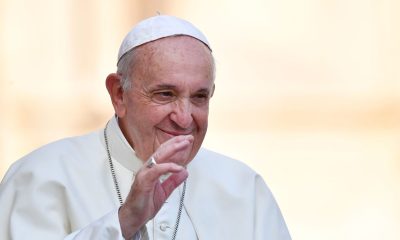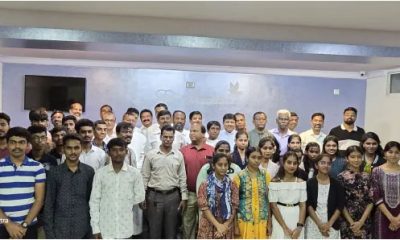world news
Pope Francis thanks Hungarian PM for accepting Ukrainian refugees

ROME — Hungarian Prime Minister Viktor Orban met with Pope Francis at the Vatican on Thursday as the war in Ukraine and the millions of refugees it has created cast a shadow over two leaders who have long sought closer ties with Russia.
The 45-minute meeting was the second between Francis and Orban in less than a year, but couldn’t have been more different in tone. The pope made a brief stop in Budapest to close out a church congress, and the awkwardness of that September encounter was evident given his and nationalist Orban’s starkly different views of mass migration to Europe.
But on Thursday, a smiling and jovial Francis showed his appreciation for the welcome Hungary had provided to Ukrainians fleeing the Russian invasion. He gave Orban a medallion of St. Martin and said he chose it specifically to honor Hungary’s reception of refugees.
Hungary has emerged as a major transit country for the war’s refugees. More than 476,000 people have entered the country’s territory from Ukraine since the conflict began eight weeks ago, according to the U.N. refugee agency.
Francis and Obran laughed frequently during Thursday’s encounter. When it was time for them to part, the pope told the prime minister in English: “May God bless you, your family and Hungary.” Orban replied “Your Holiness, we are waiting for you,” an apparent reference to Francis’ plans to return to Hungary for a pastoral visit sometime in the future.
While Orban’s government adopted anti-immigration policies in the past, it said it would welcome all those fleeing Ukraine and provide them with food, accommodation and the opportunity to work. That contrasts with Europe’s last wave of refugees.
When over 1 million people, mostly from Iraq and Syria, arrived in the European Union in 2015, Orban ordered the construction of a razor-wire fence along Hungary’s southern border and put up legal roadblocks to asylum-seekers.
Orban’s visit to the Vatican was his first foreign trip since he and his right-wing Fidesz party won Hungary’s April 3 national election, and the destination represented a departure from what has become his tradition following past elections.
Soon to begin his fourth consecutive term, Orban – the longest-serving leader in the EU – traveled to Poland’s capital, Warsaw, to visit allies after the 2010, 2014 and 2018 Hungarian elections.
Poland is Hungary’s strongest EU ally, and the government’s of the two countries have supported each other in their respective battles with the bloc over allegations that their populist governments have eroded judicial independence, media freedom and the rule of law.
But the war in Ukraine has put the warm relations between Budapest and Warsaw to the test, revealing fault lines caused by differing approaches to Moscow.
Poland, which has traditionally seen Russia as a major security threat, has been among Europe’s most active players in pushing for sanctions against Moscow and providing military aid to Ukraine.
Orban has long pursued close ties with Russian President Vladimir Putin, and in recent weeks refused to supply Ukraine with weapons or allow their transfer across the Hungary-Ukraine border. The Hungarian government also has lobbied heavily against expanding EU sanctions to include a ban on Russian energy imports, on which Hungary is dependent.
Francis, for his part, has long sought to improve relations with the Russian Orthodox Church. In 2016, he became the first pope in a millennium to meet with the church’s leader, Russian Patriarch Kirill.
Francis initially offered restrained criticism of the Russian invasion of Ukraine, maintaining the Vatican’s diplomatic tradition. But he has increasingly expressed outrage over what he called a “sacrilegious” war and the creation of millions of Ukrainian refugees, while still refraining from calling out Russia or Putin by name.
Francis is still seeking to keep open a path of dialogue with Kirill, however. They spoke by video call last month, and there have been reports they might meet face-to-face in Jerusalem in June.
http://theendtimeradio.com
world news
ബാംഗ്ലൂരിൽ സൗത്ത് ക്രിസ്ത്യൻ വെൽഫെയർ അസോസിയേഷൻ വിദ്യാർത്ഥികളെ ആദരിച്ചു
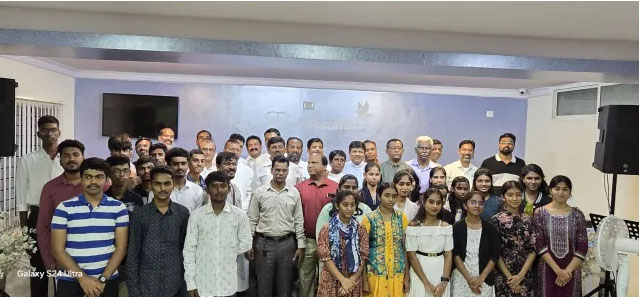
ബാംഗ്ലൂർ : ബാംഗ്ലൂർ സൗത്ത് ക്രിസ്ത്യൻ വെൽഫെയർ അസോസിയേഷന്റെ ആഭിമുഖ്യത്തിൽ 10, +2 പരീക്ഷയിൽ 80% നും മുകളിൽ മാർക്ക് നേടിയ മുപ്പതോളം വിദ്യാർത്ഥികളെ റോയൽ പബ്ലിക് സ്കൂൾ ഓഡിറ്റോറിയത്തിൽ മൊമെന്റോയും ക്യാഷ് അവാർഡും നൽകി ആദരിച്ചു.
പാ സെൽവം പ്രാർത്ഥിച്ച് ആരംഭിച്ച മീറ്റിംഗിൽ പി ജെ തോമസ് അധ്യക്ഷത വഹിച്ചു, റവ പ്രകാശ് സൈമൺ പ്രസംഗിച്ചു. സാമ്പത്തിക ബുദ്ധിമുട്ടനുഭവിക്കുന്ന വിദ്യാർത്ഥികൾക്ക് പഠിക്കുവാനുള്ള സാമ്പത്തിക സഹായവും നൽകി. റവ പളനി പീറ്റർ നന്ദി അറിയിച്ചു.
Sources:christianlive
world news
പാക്ക് ക്രൈസ്തവര് നേരിടുന്നത് കടുത്ത പീഡനം; സംരക്ഷണം ഉറപ്പാക്കാന് ഭരണകൂടം തയാറാകണമെന്ന് സന്നദ്ധ സംഘടന
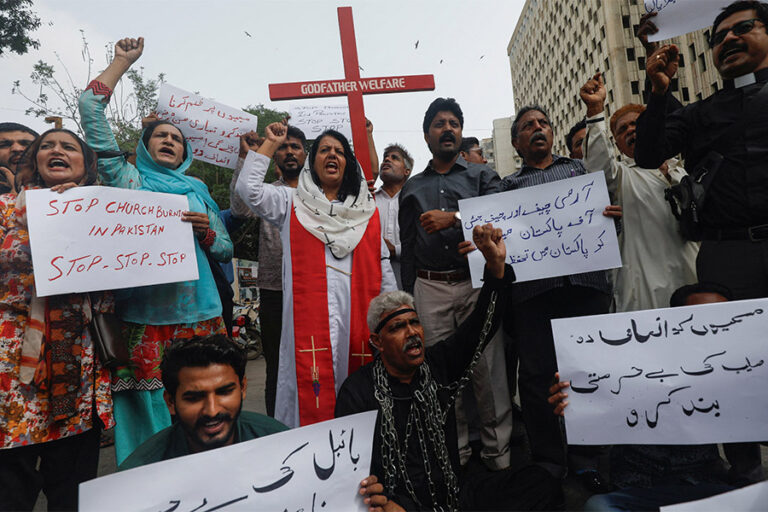
ലാഹോർ: പാക്കിസ്ഥാനിലെ ക്രൈസ്തവരുടെ സംരക്ഷണം ഉറപ്പാക്കാൻ ഫെഡറൽ, പ്രവിശ്യാ സർക്കാരുകള് തയാറാകണമെന്ന് സന്നദ്ധ സംഘടനയായ ഡിഗ്നിറ്റി ഫസ്റ്റ്. കഴിഞ്ഞ ഓഗസ്റ്റിൽ പഞ്ചാബിലെ ജരൻവാലയിൽ ക്രിസ്ത്യൻ സമൂഹത്തിന് നേരെ നടന്ന ആക്രമണത്തിന് ശേഷം, 2024 വർഷത്തിൻ്റെ ആദ്യ പകുതിയിൽ ക്രിസ്ത്യാനികൾക്കെതിരായ അക്രമവും വിദ്വേഷവും വര്ദ്ധിക്കുന്നതിനാണ് സാക്ഷ്യം വഹിച്ചതെന്ന് സംഘടന ചൂണ്ടിക്കാട്ടി. ഡിഗ്നിറ്റി ഫസ്റ്റ് ‘പെർസിക്യൂഷൻ വാച്ച്’ എന്ന പേരില് പുറത്തിറക്കിയ റിപ്പോർട്ടില് ആക്രമണങ്ങൾ, കൊലപാതകങ്ങൾ, പീഡനങ്ങൾ, തട്ടിക്കൊണ്ടുപോകലുകൾ, ലൈംഗികാതിക്രമങ്ങൾ, നിർബന്ധിത മതപരിവർത്തനം, ക്രിസ്ത്യാനികൾക്കെതിരായ മതനിന്ദ ആരോപണങ്ങൾ, ഭൂമി തട്ടിയെടുക്കൽ, കുടിയൊഴിപ്പിക്കൽ തുടങ്ങീ ക്രൈസ്തവര്ക്ക് നേരെ വിവിധങ്ങളായ ആക്രമണങ്ങളാണ് അരങ്ങേറുന്നതെന്ന് സംഘടന പറയുന്നു.
ജനുവരി മുതൽ ജൂൺ വരെ കഴിഞ്ഞ ആറ് മാസത്തിനിടെ നടത്തിയ ആക്രമണങ്ങള് ഭയാനകമാണെന്നും, സംരക്ഷണം ഉറപ്പാക്കാൻ ഭരണകൂടം അടിയന്തര പ്രായോഗിക നടപടികൾ സ്വീകരിക്കണമെന്നും ഡിഗ്നിറ്റി ഫസ്റ്റ് എക്സിക്യൂട്ടീവ് ഡയറക്ടർ യൂസഫ് ബെഞ്ചമിൻ മാധ്യമങ്ങളോട് പറഞ്ഞു. ആറ് മാസത്തിനുള്ളിൽ ക്രൈസ്തവര്ക്ക് നേരെ എഴുപതിലധികം ആക്രമണങ്ങൾ ഉണ്ടായിട്ടുണ്ടെന്നും ഇത് നൂറ്റിനാല്പ്പതിലധികം ക്രിസ്ത്യൻ കുടുംബങ്ങളെ ബാധിച്ചതായും ബെഞ്ചമിൻ വെളിപ്പെടുത്തി.
പഞ്ചാബ് പ്രവിശ്യയിൽ മാത്രം അഞ്ച് അക്രമ ആക്രമണങ്ങളാണ് ഉണ്ടായത്. ഇവയില് 3 എണ്ണം ക്രിസ്ത്യൻ കുടുംബങ്ങളെയും 2 ആക്രമണം പള്ളികളെ ലക്ഷ്യമാക്കിയായിരിന്നുവെന്നും അദ്ദേഹം ചൂണ്ടിക്കാട്ടി. ക്രൈസ്തവര് ജോലി മേഖലയിലും വിദ്യാഭ്യാസ മേഖലയിലും പിന്തള്ളപ്പെടുന്നുണ്ട്. ക്ലീനിംഗ് ജോലികൾക്ക് ‘ക്രിസ്ത്യാനികൾക്ക് മാത്രമേ’ അപേക്ഷിക്കാനാകൂ എന്ന വിവേചനപരമായ തൊഴിൽ പരസ്യം ഖൈബർ പഖ്തൂൺഖ്വയിലെ പത്രങ്ങളിൽ പ്രസിദ്ധീകരിച്ചതും സംഘടന ചൂണ്ടിക്കാട്ടുന്നു.
8 ക്രിസ്ത്യൻ ആരോഗ്യ പ്രവർത്തകർക്കു ജോലിസ്ഥലത്ത് വിവേചനം നേരിടുകയും സുരക്ഷാ കിറ്റുകളുടെ അഭാവം മൂലം ജീവൻ നഷ്ടപ്പെടുകയും ചെയ്തു. എട്ടോളം ക്രിസ്ത്യൻ പെൺകുട്ടികളെ തട്ടിക്കൊണ്ടുപോയി ലൈംഗികമായി ചൂഷണം ചെയ്ത ശേഷം നിർബന്ധിത മതപരിവർത്തനം നടത്തിയതായി ഡിഗ്നിറ്റി ഫസ്റ്റ് ശേഖരിച്ച വിവരങ്ങൾ വെളിപ്പെടുത്തുന്നു. ഇവരുടെ പ്രായം 11നും 16നും ഇടയിലാണെന്നതാണ് ശ്രദ്ധേയമായ വസ്തുത. പെണ്കുട്ടികളില് 7 പേർ പഞ്ചാബിൽ നിന്നും 1 പേർ സിന്ധിൽ നിന്നുമാണ്. ലാഹോറിൽ ഇസ്ലാം മതം സ്വീകരിക്കാൻ വിസമ്മതിച്ചതിനെ തുടർന്ന് 13 വയസ്സുള്ള ക്രിസ്ത്യൻ ബാലനെ വിഷ പദാർത്ഥം കഴിക്കാൻ നിർബന്ധിച്ചുവെന്നും സംഘടന റിപ്പോര്ട്ടില് വെളിപ്പെടുത്തുന്നുണ്ട്.
കടപ്പാട് :പ്രവാചക ശബ്ദം
world news
കോംഗോയിൽ ഭീകരാക്രമണം; 3 ക്രൈസ്തവർ കൊല്ലപ്പെട്ടു

കോംഗോ : കോംഗോയിലെ മാമോവിന് സമീപമുള്ള ഒരു ക്രിസ്ത്യൻ ഗ്രാമത്തിനു നേരെയാണ് ഇസ്ലാമിസ്റ്റ് അലൈഡ് ഡെമോക്രാറ്റിക് ഫോഴ്സ് എന്ന ഭീകരവാദികൾ ആക്രമണം നടത്തിയത്. ആക്രമണത്തിൽ മൂന്ന് ക്രൈസ്തവർ കൊല്ലപ്പെട്ടു. നിരവധി പേരെ ഭീകരർ തട്ടിക്കൊണ്ടുപോകുകയും ചെയ്തു.
ജൂലൈ 16-ന് രാത്രിയാണ് ആക്രമണം ഉണ്ടായത്. ആക്രമണത്തിൽ ഏഴ് വീടുകൾ കത്തിനശിച്ചു. പ്രദേശവാസികളോടും ചുറ്റുമുള്ള സമൂഹങ്ങളോടും ജാഗ്രത പാലിക്കാൻ ആംഗ്ലിക്കൻ ചർച്ച് ഓഫ് ബെനിയുടെ ബിഷപ്പ് ആഹ്വാനം ചെയ്തു.
Sources:christianlive
-
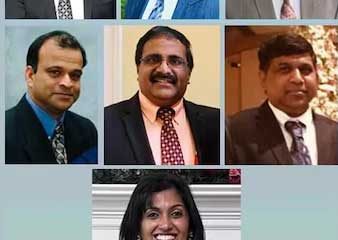
 us news11 months ago
us news11 months agoനോര്ത്ത് അമേരിക്കന് പെന്തക്കോസ്തല് റൈറ്റേഴ്സ് ഫോറം; അറ്റ്ലാന്റാ ചാപ്റ്ററിന് പുതിയ ഭാരവാഹികള്
-

 National11 months ago
National11 months agoബൈബിൾ വിതരണം ചെയ്യുന്നതും നല്ല മൂല്യങ്ങൾ പഠിപ്പിക്കുന്നതും മതപരിവർത്തനമല്ല: അലഹബാദ് ഹൈക്കോടതിയുടെ നിര്ണ്ണായക വിധി
-

 world news10 months ago
world news10 months ago50 രാജ്യങ്ങളിലേക്ക് കുവൈത്ത് പൗരന്മാർക്ക് വിസയില്ലാതെ സഞ്ചരിക്കാം
-

 National5 months ago
National5 months agoനെയ്തേലിപ്പടി ക്രൂസേഡിന് അനുഗ്രഹീത സമാപ്തി
-

 Life11 months ago
Life11 months agoസൂര്യനെ ലക്ഷ്യമിട്ട് കുതിച്ച് ആദിത്യ എൽ1; ഇന്ത്യയുടെ ആദ്യ സൗരദൗത്യം വിജയകരം
-

 National9 months ago
National9 months agoPentecostal mission center demolished in India; pastor, 17 others arrested
-

 Life10 months ago
Life10 months agoമനുഷ്യന് താമസിക്കാന് ചന്ദ്രനില് വീടുകള്; നാസ 3ഡി പ്രിന്ററുകള് ചന്ദ്രനിലേക്കയക്കും
-

 Travel2 months ago
Travel2 months agoയാക്കൂസ കരിഷ്മ:ഓല സ്കൂട്ടറിനേക്കാൾ വിലക്കുറവിൽ കുഞ്ഞൻ കാർ; സിറ്റി യാത്രകൾക്ക് ഇനി ഇവൻ മതിയാവും









